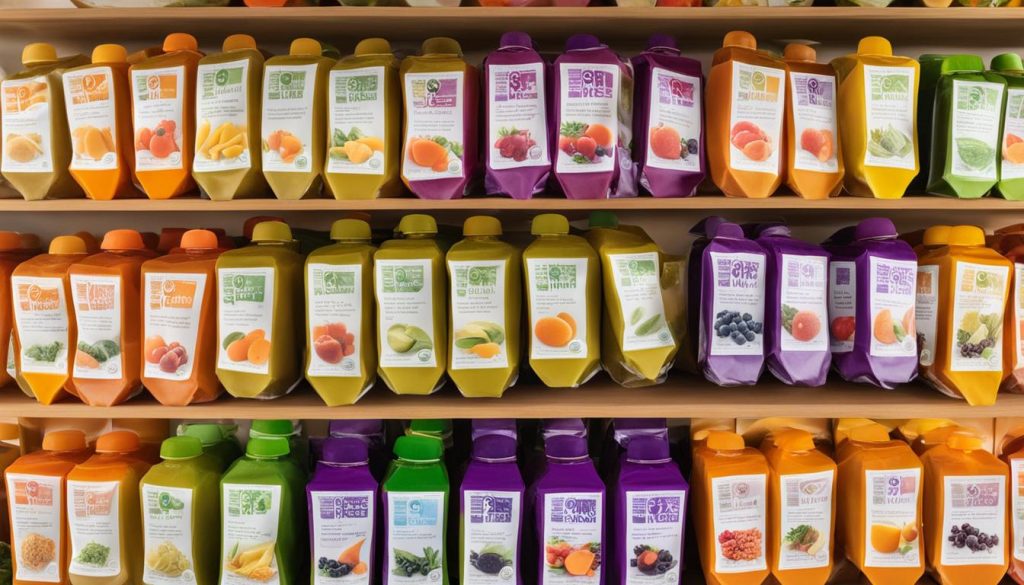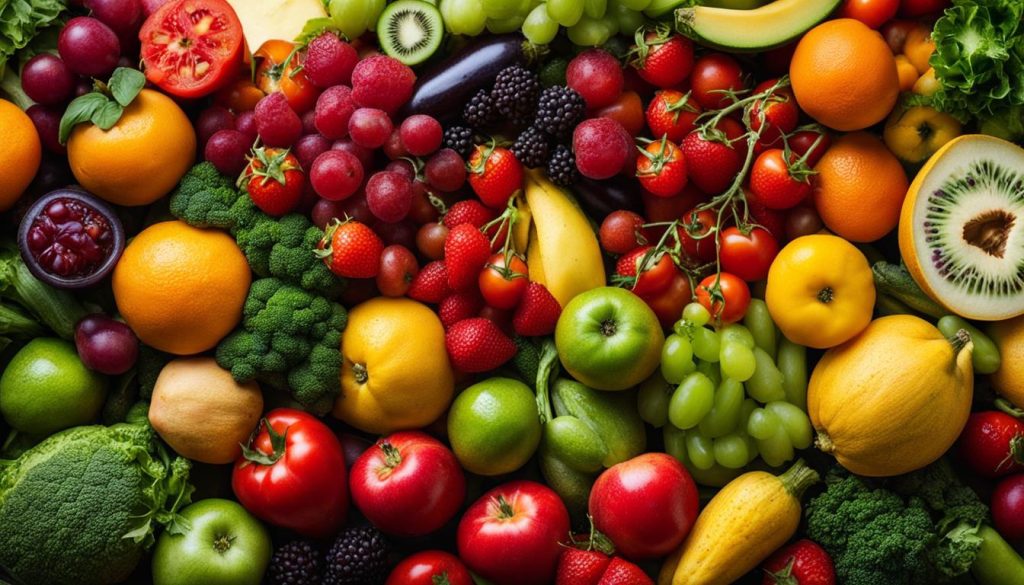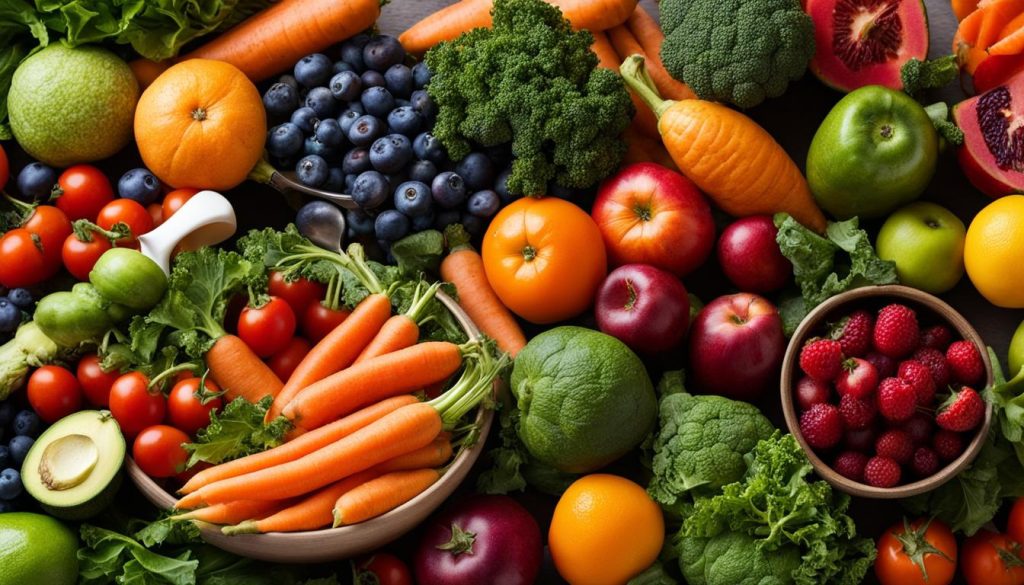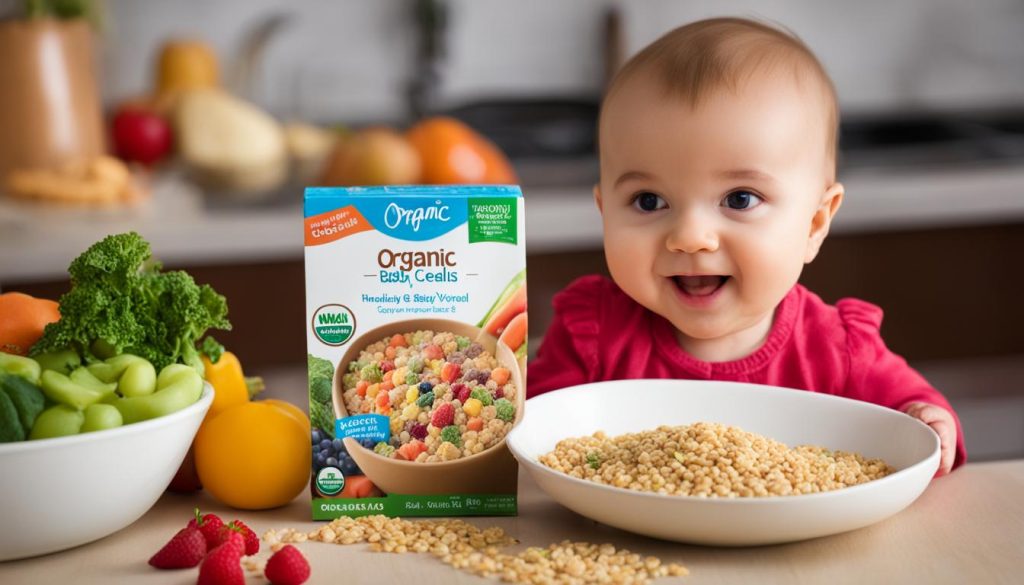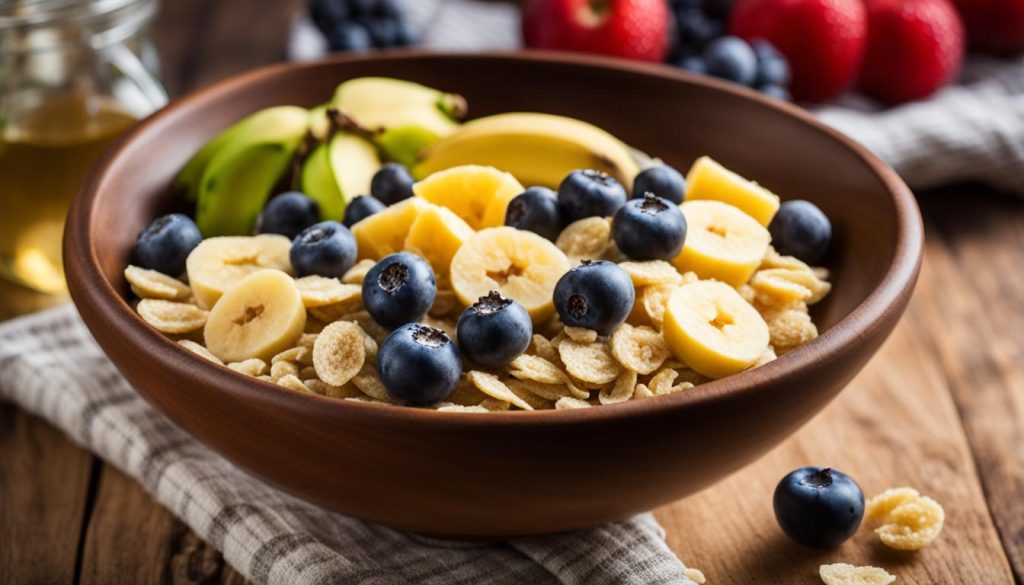When it comes to providing convenient and nutritious options for your baby, the best organic baby food pouches are a top choice. Made with organic ingredients and free from added sugars, preservatives, and additives, these pouches offer a convenient way to introduce a variety of flavors and textures to your baby’s diet.
Some of the top picks for the best organic baby food pouches include brands like Once Upon a Farm Organic Fruit & Veggie Blends, Happy Baby Organics Stage 2 Baby Food Pouches, Tiny Organics Tiny Purees, Yumi Blends, Cerebelly Organic Baby Puree, and Serenity Kids Ethically Sourced Meat Baby Food Pouches. These brands are certified USDA organic, meeting strict standards for organic food production. They prioritize the use of whole ingredients and ensure the absence of pesticides.
What sets these organic baby food pouches apart is not only their commitment to organic ingredients but also their attention to additional nutrients. Some brands include omega-3s and choline to support baby brain health and development.
While baby food pouches offer convenience, it’s important to remember that they should be used in moderation and not relied upon as the sole source of nutrition for babies. Consult with your pediatrician or registered dietitian to ensure your baby is getting a well-rounded diet.
Benefits and Considerations of Organic Baby Food for Young Children’s Health and Development
When it comes to feeding our little ones, we want to make sure we’re giving them the best start possible. That’s why many parents opt for organic baby food, which offers several benefits for the health and development of young children. Organic foods are grown without the use of synthetic pesticides and fertilizers, reducing the exposure to harmful chemicals. This can be especially important for infants, whose developing bodies may be more susceptible to the negative effects of these substances.
Furthermore, organic baby food tends to be higher in certain nutrients, such as vitamins, minerals, and antioxidants. These essential nutrients play a crucial role in supporting healthy growth and development. By choosing organic options, parents can ensure that their little ones are getting the best possible nutrition. Additionally, organic baby food often contains fewer additives and preservatives, providing a more natural and wholesome option for your baby’s delicate digestive system.
When choosing organic baby food, it’s important to consider the quality of the ingredients and the certifications they hold. Look for brands that are certified USDA organic, as this guarantees that the ingredients meet strict organic standards. This certification ensures that the food is free from synthetic pesticides, genetically modified organisms (GMOs), and other potentially harmful substances. Consulting with a pediatrician or registered dietitian can provide personalized recommendations based on your baby’s individual needs and development.
The Importance of Organic Food for Infants
One of the key advantages of organic baby food is its potential to reduce the exposure to harmful chemicals commonly found in conventionally grown foods. Infants are particularly vulnerable to the effects of pesticides and other toxins due to their smaller body size and developing immune systems. By choosing organic options, parents can provide their babies with a safer and healthier start in life.
The Differences Between Organic and Conventional Baby Foods
When it comes to choosing baby food for your little one, you may be faced with the decision between organic and conventional options. Understanding the differences between these two types of baby food can help you make an informed choice that aligns with your values and priorities.
Organic baby foods are made from ingredients that are grown without the use of synthetic pesticides or fertilizers. They are also free from genetically modified organisms (GMOs). On the other hand, conventional baby foods may be made from conventionally grown ingredients that may have been treated with pesticides and may contain GMOs.
One of the main advantages of organic baby foods is the absence of pesticides. By choosing organic options, you can reduce your baby’s exposure to potentially harmful chemicals. Additionally, organic baby foods often contain higher levels of certain nutrients and antioxidants compared to their conventional counterparts.
While both organic and conventional baby foods undergo safety regulations and testing, opting for organic baby food can provide peace of mind, knowing that the ingredients used are grown in a more sustainable and environmentally friendly manner.
Nutritional Comparison: Organic vs. Conventional Baby Foods
| Nutrient | Organic Baby Food | Conventional Baby Food |
|---|---|---|
| Vitamins and Minerals | Organic baby foods often contain higher levels of vitamins and minerals due to the use of organic growing methods. | Conventional baby foods may contain lower levels of vitamins and minerals due to potential nutrient depletion during conventional farming practices. |
| Absence of Pesticides | Organic baby foods are free from synthetic pesticides, reducing potential exposure to harmful chemicals. | Conventional baby foods may contain traces of pesticides used during conventional farming. |
| Antioxidants | Organic baby foods tend to have higher levels of antioxidants, which play a role in reducing oxidative stress and promoting overall health. | Conventional baby foods may contain lower levels of antioxidants due to potential nutrient depletion. |
“Choosing organic baby food can provide peace of mind, knowing that the ingredients used are grown in a more sustainable and environmentally friendly manner.”
Ultimately, the decision between organic and conventional baby food is a personal one. Consider your priorities, budget, and values when making this choice. It’s also important to consult with your pediatrician or a registered dietitian for personalized recommendations based on your baby’s individual needs and development. Remember, whether you choose organic or conventional baby food, the most important factor is offering a balanced and nutritious diet for your little one.
Tips for Choosing the Best Organic Baby Food Pouches
When it comes to selecting the best organic baby food pouches, there are several important factors to consider. As a parent, you want to ensure that you are providing your baby with nutritious and high-quality options. Here are some tips to help you make the right choice:
- Look for certified USDA organic brands: Choosing baby food brands that are certified USDA organic guarantees that the ingredients used meet strict organic standards. This certification ensures that the food is free from pesticides, synthetic fertilizers, and genetically modified organisms (GMOs).
- Consider the quality of ingredients: It’s important to check the quality of the ingredients used in the organic baby food pouches. Look for brands that prioritize using whole, natural ingredients and avoid additives and preservatives.
- Read reviews and recommendations: Reading reviews and recommendations from other parents can provide valuable insights into the taste, texture, and overall quality of different baby food brands. This can help you make an informed decision and choose the best organic baby food pouches for your little one.
- Take into account dietary needs and restrictions: Every baby is unique, and they may have specific dietary needs or restrictions. Consider any allergies or sensitivities your baby may have and choose baby food pouches accordingly. Consulting with a pediatrician or registered dietitian can provide personalized recommendations based on your baby’s needs and preferences.
By considering these tips, you can select the best organic baby food pouches that provide both convenience and nutrition for your little one.
| Brand | USDA Organic Certified | Ingredients | Additional Features |
|---|---|---|---|
| Once Upon a Farm Organic Fruit & Veggie Blends | Yes | Organic fruits and vegetables | Non-GMO, no added sugars |
| Happy Baby Organics Stage 2 Baby Food Pouches | Yes | Organic fruits, vegetables, and grains | Non-GMO, no artificial flavors or colors |
| Tiny Organics Tiny Purees | Yes | Organic fruits, vegetables, and grains | No added sugars, plant-based proteins |
| Yumi Blends | Yes | Organic fruits, vegetables, and grains | Customizable subscription, tailored to baby’s age and needs |
“Choosing the best organic baby food pouches is an important decision for parents. It’s crucial to prioritize brands that use organic ingredients and avoid additives. Reading reviews and consulting with experts can help ensure you make the right choice for your baby’s nutrition and health.”
The Importance of Introducing a Variety of Flavors and Textures to Your Baby’s Diet
When it comes to your baby’s diet, introducing a variety of flavors and textures is of utmost importance. Not only does it contribute to their overall development, but it also helps them accept and appreciate different types of foods. As a parent, you can rely on the best organic baby food pouches to make this process easier and more convenient.
Organic baby food options are abundant, offering a wide range of flavors and textures to choose from. From fruits and vegetables to grains and meats, these pouches allow you to create custom meals that cater to your baby’s unique tastes and nutritional needs. By incorporating a diverse selection of ingredients, you can expose your little one to different tastes and encourage them to become more adventurous eaters.
Starting with single-ingredient purees and gradually introducing more complex blends is recommended. This approach not only helps your baby adjust to new flavors and textures, but it also promotes sensory development. Mixing various flavors and textures in their meals can stimulate their taste buds and encourage them to explore different combinations.
When looking for the best organic baby food pouches, keep in mind the importance of quality ingredients and certifications. Opt for brands that offer USDA organic certification, ensuring that the ingredients meet the rigorous standards of organic food production. By prioritizing the introduction of a variety of flavors and textures, you can provide your baby with a well-rounded and nutritious diet.
FAQ
What are the best organic baby food pouches for convenient nutrition?
Some top picks for the best organic baby food pouches include Once Upon a Farm Organic Fruit & Veggie Blends, Happy Baby Organics Stage 2 Baby Food Pouches, Tiny Organics Tiny Purees, Yumi Blends, Cerebelly Organic Baby Puree, and Serenity Kids Ethically Sourced Meat Baby Food Pouches.
What are the benefits and considerations of organic baby food for young children’s health and development?
Organic baby food offers several benefits, including reduced exposure to harmful chemicals as organic foods are grown without synthetic pesticides and fertilizers. Organic baby food tends to be higher in certain nutrients and contains fewer additives and preservatives.
What are the differences between organic and conventional baby foods?
Organic baby foods are made from organic ingredients that are grown without synthetic pesticides or fertilizers, while conventional baby foods may contain conventionally grown ingredients treated with pesticides. Organic baby foods also do not contain genetically modified organisms (GMOs).
How can I choose the best organic baby food pouches?
Look for brands that are certified USDA organic, prioritize whole ingredients, and are free from additives and preservatives. Consider the quality of the ingredients, sustainability practices, and read reviews from other parents. Consult with a pediatrician or registered dietitian for personalized recommendations.
Why is it important to introduce a variety of flavors and textures to my baby’s diet?
Introducing a variety of flavors and textures promotes sensory development and encourages your baby to become an adventurous eater. Organic baby food pouches offer a convenient way to expose your baby to different foods and flavors.

